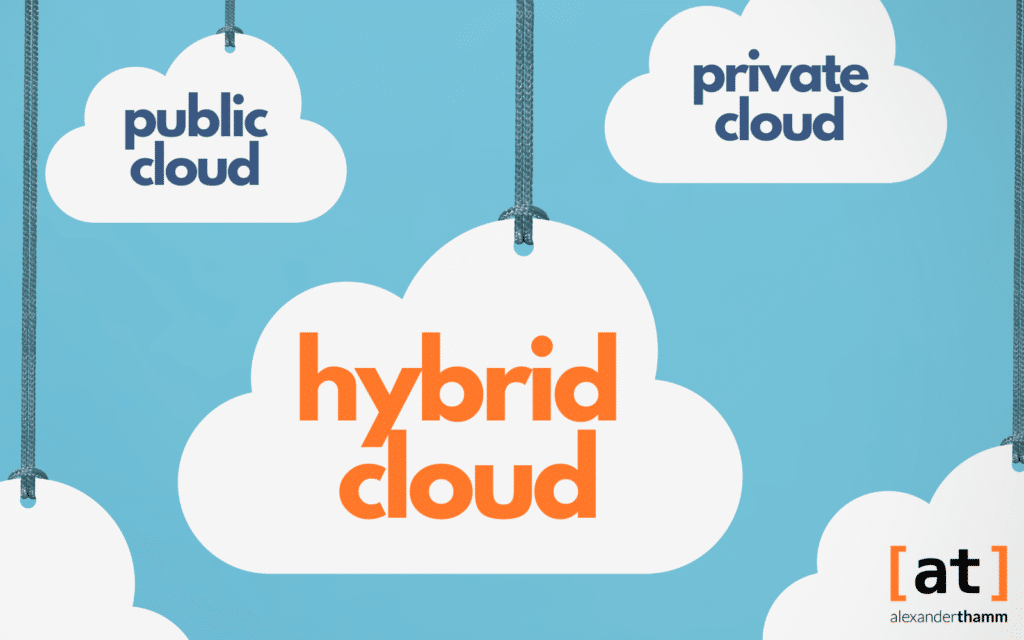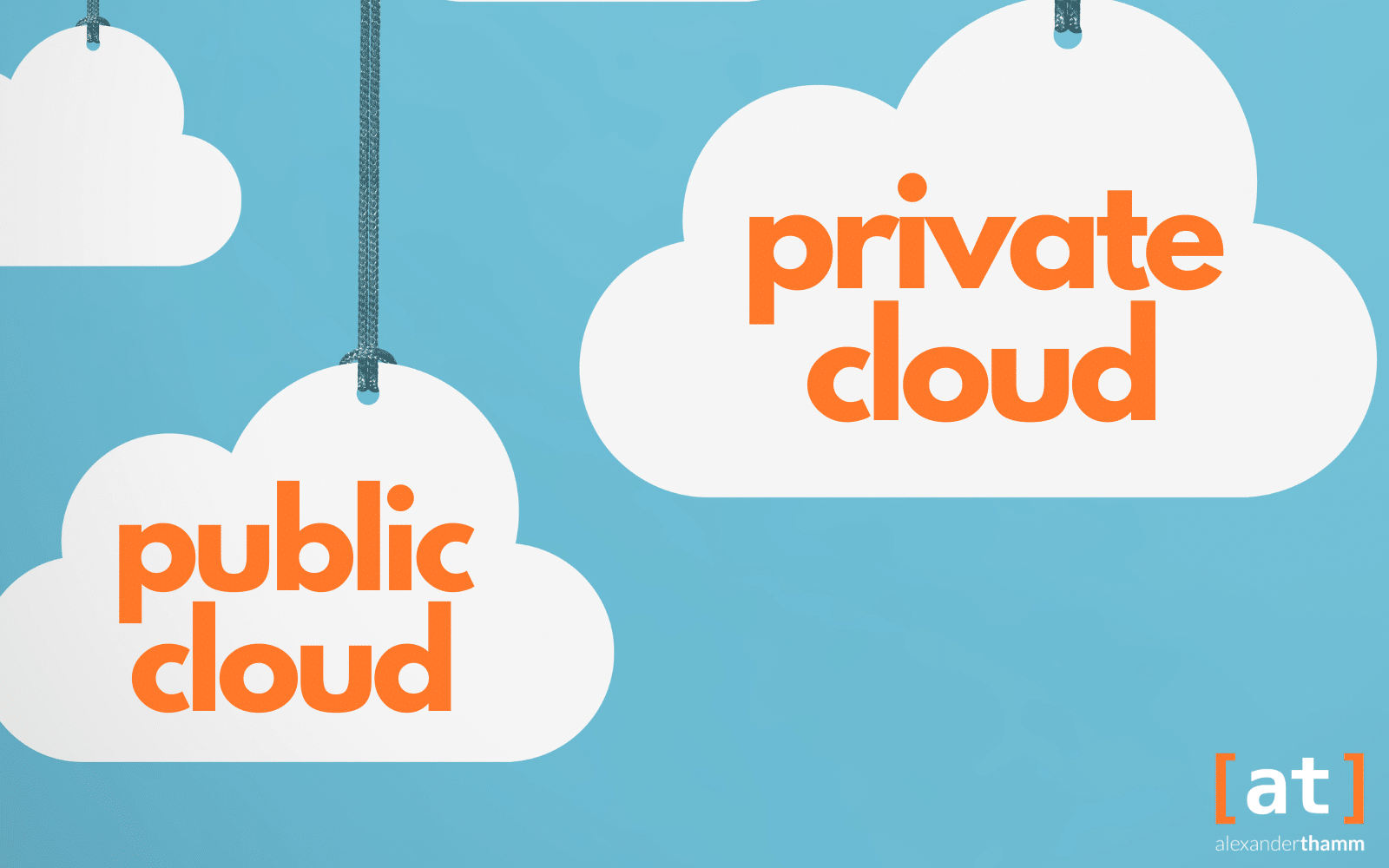Deciding whether a public or private cloud is the right option for one's company can be a significant strategic choice. It is important to understand both options and carefully weigh up the individual needs and requirements of one's own company.
In this context, the terms public and private cloud are clarified below, their differences are shown, and the respective advantages and disadvantages and areas of application are considered. This creates the basis that will support you in choosing the appropriate cloud option for your company.
Inhaltsverzeichnis
What is a public cloud?
A public cloud is a Cloud computing model, the Publicly accessible and provided by a cloud service provider becomes. In the public cloud, several customers share the same infrastructure and resources, such as servers, storage, network and applications, which are provided via the internet. The service provider, such as Amazon Web Services (AWS), Microsoft Azure or Google Cloud Platform, is responsible for the maintenance, management and security of the infrastructure. Customers typically pay for the use of the resources they need, either on a pay-per-use basis or through subscription models.
How does a public cloud work?
A public cloud is based on the idea that cloud service providers provide IT resources such as computing power, storage, network and applications and make these resources accessible via the internet. Users can then use these resources for their own applications without having to worry about operating and maintaining the underlying infrastructure.
The How a public cloud works can be described as follows:
- Provision of resources: The cloud service provider provides IT resources such as virtual machines, storage, networks and applications that are accessible via the internet.
- Scalability: Users can scale resources quickly and easily, depending on their needs. This means that they can add additional resources when they are needed and remove resources when they are no longer needed.
- Self-Service: Users can provision and manage resources independently and automatically, without needing the support of IT professionals.
- Settlement: Users only pay for the resources they actually use. Billing is usually based on the duration of use or the amount of use.
What are the advantages and disadvantages of a public cloud?
As public clouds are operated by large cloud service providers, companies can benefit from the Benefits of large economies of scale benefit, such as lower costs for infrastructure, higher availability and reliability of services, and faster provision of resources.
However, public clouds also have some disadvantages, such as limited control, dependence on third-party providers and possible limitations in adapting to specific business needs.
Advantages
- ScalabilityPublic clouds can be adapted quickly and easily to meet growing demands. Companies can add resources when they are needed and remove resources when they are no longer needed.
- Cost efficiencyPublic clouds can bring cost savings, as companies only have to pay for the resources they actually use and there are no high investment costs for their own infrastructure.
- Flexibility: Public clouds offer a wide range of services and applications that are easily accessible via the internet and can be quickly adapted.
- Global availabilityPublic clouds can be used from anywhere in the world as long as there is an internet connection.
- SecurityCloud service providers typically provide robust security mechanisms to protect data and applications.
Disadvantages
- Dependence on third party suppliers: Companies are dependent on the services of the cloud service provider, which can bring risks in terms of service quality, availability and support.
- Data protection and complianceCompanies must ensure that data stored in the public cloud meets data protection and compliance requirements.
- Loss of control: By using a public cloud, companies relinquish control over the underlying infrastructure and data to the cloud service provider.
- Performance problems: Performance problems can occur when the public cloud infrastructure is used by many users at the same time, which can lead to bottlenecks and delays.
- Restrictions on adaptationPublic clouds typically offer limited customisation to meet individual business needs. This can lead to trade-offs in the selection and implementation of cloud services.
What are the application examples of the public cloud?
The Flexibility and scalability of public clouds makes them ideal for a wide range of applications in many different industries, including:
- Website hosting: Companies can host their websites on public cloud servers to ensure high availability and scalability.
- E-mail and messaging services: Companies can use cloud-based email and messaging services to reduce the cost and complexity of on-premises email servers.
- Data analysis and processing: Public clouds can be used for Big Data analytics and data processing to handle enormous amounts of data quickly and cost-effectively.
- Development and testsDevelopers can use public cloud platforms to create, test and deploy applications quickly and easily.
- Collaboration and document managementCompanies can use public cloud platforms to improve collaboration between teams and document management.
- Mobile applications: Public clouds can be used for mobile app development and deployment to ensure scalability and speed to market.
- E-commerceCompanies can use public clouds to host and scale e-commerce websites and applications to meet the demands of growing online commerce.
- Backup and disaster recovery: Public clouds can be used as backup and disaster recovery solutions to ensure data and application availability in case of failures or disasters.

Cloud computing offers numerous advantages and functions for operational processes. Read all the relevant information about this technology in our introductory article:
What is a private cloud?
A private cloud is a cloud computing model that is designed for the exclusive use provided by an organisation or company becomes. Unlike the public cloud, where several customers share the same infrastructure resources, the private cloud has a dedicated infrastructure that is only used by the organisation that operates it. The private cloud can be operated on the organisation's own premises or in a cloud service provider's data centre. The organisation has control and responsibility for the infrastructure and can customise and configure it according to its needs. Private cloud implementations can be done through the organisation's own data centre or through a cloud service provider that provides dedicated infrastructure.
There is Four different types of private clouds:
- Internal Private Cloud: The company operates its cloud services entirely in-house and manages the IT infrastructure itself.
- Managed Private Cloud: With this type, the IT infrastructure for the cloud is hosted internally but managed by an external provider. This gives companies the flexibility of a private cloud while optimally tailoring the functions to their own needs.
- Hosted Private Cloud: The hosted private cloud is located in a data centre of a cloud service provider. The provider manages the entire cloud on behalf of the company and provides customised applications to the benefits.
- Community Private Cloud: This is a special form of private cloud where several companies have shared access to a cloud, often from the same industry. This is why it is also called an industry-specific private cloud.
Especially for small and medium-sized enterprises, setting up an internal private cloud can be a challenge, as they often lack the technical know-how and the budget. Therefore, these companies often opt for managed or hosted private clouds.
What are the advantages and disadvantages of a private cloud?
Since a private cloud is operated within its own infrastructure, it offers a Higher level of control, security and data protection compared to public cloud platforms. However, building and operating a private cloud often requires significant investment in infrastructure, software and personnel and less scalability.
Advantages
- Control and security: A private cloud gives the company full control over its data and applications. Companies can apply their security policies and ensure that their data is not shared on public clouds or other clouds.
- AdaptabilityCompanies can adapt the private cloud to their specific requirements by selecting and configuring hardware and software according to their wishes.
- Cost efficiencyPrivate clouds can be more cost-effective in the long run, as companies have more control and stability in the long run and thus spend less on cloud subscriptions and services.
Disadvantages
- Cost-intensivePrivate clouds require a significant investment in IT infrastructure and the staff to operate and manage them.
- InflexibilityPrivate clouds can be less flexible than public clouds when it comes to adapting to rapidly changing business needs.
- Scaling limitationsPrivate clouds have limited scalability and may not be able to grow fast enough to meet the needs of the business.
How does a private cloud work?
A private cloud consists of a set of virtualised resources such as virtual machines, networks, storage and applications that are provided and managed by the organisation itself.
A private cloud usually works as follows:
- Virtualisation: The private cloud begins with the virtualisation of hardware resources such as CPU, RAM and storage. These resources are divided into logical units that can be shared by multiple applications and users.
- Cloud management software: Cloud management software is used to automate and simplify the virtualisation and management of cloud resources. This software enables users to provision and manage virtual machines and other cloud resources in a straightforward and quick manner.
- Self-service portal: A self-service portal is usually set up to provide users with quick and easy access and management options for the resources provided.
- Network and security configuration: Network and security configuration is an important aspect of a private cloud. A secure network configuration is set up to ensure that the cloud resources are protected from unauthorised access.
- Scalability: A private cloud can be scalable according to need. The organisation can add additional resources to improve the performance and scalability of the cloud.
What are the application examples of the private cloud?
A private cloud can be used for a variety of use cases, especially for businesses and organisations that need greater control over their IT infrastructure. Some use cases for private clouds are:
- Data and application hosting: A private cloud can be used to host corporate applications and data, including financial data, customer data, personnel files and other confidential information.
- Virtualisation of desktops and applications: A private cloud can also be used to virtualise desktops and applications, giving users easy and secure access to corporate applications from anywhere.
- Development and testingA private cloud can be used for application development and testing to provide a secure and isolated environment for developers to build, test and deploy applications.
- Disaster Recovery: A private cloud can also be used as a disaster recovery solution to ensure that business operations can be maintained in the event of a system failure or disaster.
- Research and development: A private cloud can also be used for research purposes, especially in areas such as science, medicine and technology where large amounts of data and computationally intensive tasks need to be processed.
What is the difference between public and private cloud?
Public clouds and private clouds differ in many aspects. The choice between the two depends on the specific needs and priorities of the company or organisation. A public cloud often offers greater scalability and cost efficiency, while a private cloud offers more control, security and customisation.
- Accessibility: A public cloud is accessible via the internet, while a private cloud is hosted on a private network or dedicated infrastructure.
- ResourcesIn a public cloud, several customers share an infrastructure and resources such as computing power, storage and network bandwidth. A private cloud, on the other hand, is reserved exclusively for a single company.
- Control: In a public cloud, the cloud provider has control over the infrastructure, whereas in a private cloud, the organisation has full control over the infrastructure and the data.
- Security: A private cloud usually offers a higher level of security because the infrastructure and data belong to the company and it has control over the security measures. In a public cloud, multiple customers share the infrastructure, leading to potential security risks.
- CostsA public cloud is often more cost-effective because the costs of operating, maintaining and supporting the infrastructure can be shared among several customers. A private cloud, on the other hand, requires its own infrastructure, which may require higher investments in hardware, staff and support.
- Scalability: A public cloud usually offers greater scalability and flexibility, as customers can simply request and pay for additional resources as needed. In a private cloud, scalability depends on the capacity and configuration of one's own infrastructure.
How safe are both models?
In a Public Cloud security is dependent on factors such as the security configuration of the cloud platform, the security processes of the cloud provider, the Data security and encryption, control and management of access permissions, and monitoring and protection against threats and attacks. Cloud providers therefore often provide a variety of security measures, such as firewall protection, monitoring, encryption and security checks.
A Private Cloud often offers More control and customisation options for safety, as the company itself has control over the infrastructure and security measures. These can be tailored to the company's specific requirements and include measures such as the security configuration of servers and network components, monitoring and control of access to data and resources, encryption of data and protection against threats and attacks.
Despite all measures, neither public clouds nor private clouds offer complete security. Adequate security measures and their regular reviews are therefore very important.

Data security and data protection are central functions for securing operational data and value chains. Protect yourself in the best possible way and get comprehensive advice on this topic:
Data security - the most important basics on the topic of data security
What should be considered when implementing a public or private?
The implementation of a public cloud
Implementing a public cloud requires various considerations and measures to ensure smooth and secure operation. Security measures of the cloud provider should be sufficient to ensure the Confidentiality, integrity and availability of corporate data to protect.
Compliance requirements must also be observed, especially when it comes to the Processing of sensitive data goes.
The cost of using public cloud services should be carefully considered to ensure value for money. Scalability is also important to ensure that the chosen cloud can meet the growing needs of the business. Seamless integration of public cloud services into the company's existing IT infrastructure is another factor to enable smooth collaboration. In addition, clear service level agreements (SLAs) should be made with the cloud provider to ensure the availability and performance of the public cloud services.
The implementation of a private cloud
Implementing a private cloud requires careful planning to ensure that it meets the specific requirements of the business and that Sufficient resources available stand. A Powerful and reliable IT infrastructure is necessary to create an effective private cloud environment. The security measures of the private cloud must be thoroughly planned and implemented to ensure the Confidentiality, integrity and availability of corporate data to ensure.
The private cloud environment should be scalable to meet the growing needs of the business. Automation of management and maintenance of the private cloud environment is also required to work efficiently and reduce operating costs. Adherence to compliance requirements, especially when processing sensitive data, is also of great importance. In addition, clearly defined service level agreements (SLAs) with an internal IT department or service provider are necessary to ensure the availability and performance of the private cloud.

Cloud migration is the transfer of corporate data and content to the cloud. Find out more about the prerequisites, strategies and processes in our article:
What are the opportunities and potentials for companies?
The implementation of a public or private cloud offers companies a wide range of opportunities and potential. Cloud models enable scalability, cost reduction, increased efficiency, innovation, data security and improved collaboration. Companies can act more flexibly, adapt more quickly to new market conditions and reduce their IT costs. They can also make business processes more efficient, promote innovation and improve collaboration within and outside the company. These potentials can support companies in this, Become more competitive and optimise their business processes.
However, it is important to note that the use of cloud models also brings challenges that need to be carefully addressed. Factors such as data security, compliance requirements, availability, cost and scalability should be considered when deciding which cloud model is most appropriate. A clear business strategy and the individual needs of the company are equally relevant in the decision.
In conclusion, cloud technology is a valuable option for companies to optimise their IT infrastructure, improve their business processes and become more competitive. However, choosing the right cloud model is crucial to achieve the best results. A Hybrid cloud strategy can also be considered to combine the advantages of both models. It is advisable to carefully weigh the pros and cons and make an informed decision to realise the full potential of cloud technology.

Hybrid cloud solutions offer companies even more flexibility and security. Find out from us about the benefits and challenges of integrating this cloud model:
Do you have questions about the integration of cloud services in your company? Then please do not hesitate to contact us. We are happy to be at your disposal at any time and offer non-binding advice.











0 Kommentare